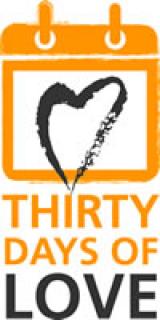30 Days of Love: 3/30
Growing up in North Carolina, the need for Rev. Martin Luther King Jr., never seemed real. In the idyllic bubble that was Davidson, outside of Charlotte, the need for civil rights work and push for equality was distant. But as I aged the veils of unreality that clouded my view gradually stripped away, piece by piece, and I began to realize that my experience was not the norm – especially near Charlotte, an area that has had infamous struggles with racially based discrimination and segregation, particularly in its schools.
I learned that my high school mascot used to be "The Rebel", who would wave the Confederate flag during football games. Even more troubling was that the Klu Klux Klan used my school as a meeting place up until the late 1970s – well within living memory, and years after the passage of the Civil Rights Act of 1964 outlawing major forms of discrimination. I saw first hand the practice of an informal segregation by academics, as although the student population at my school was roughly 1/3 White, 1/3 Hispanic or Latino, and 1/3 African American, in my senior year taking Advanced Placement and International Baccalaureate classes, Hispanic, Latino and African Americans were visibly absent. My staff and teachers at the time were mostly White, with the notable exception of my Guatemalan Spanish teacher.
As a college history major I saw Martin Luther King as a product of his time and place, standing on the shoulders of the civil rights giants within the African American community that came before him while inspiring a new generation of fighters for civil rights and social justice. Someone like him was bound to come along, because the conditions were right. Other African Americans were organizing and doing great things-groups such as SNCC (Student Nonviolent Coordinating Committee), the NAACP, and the Urban League worked with Left-wing political groups such as the Socialist Party of America on the front lines of the struggle for civil rights. Out of this wellspring of passionate people with great ideas, mass communication and media, and other political movements- such as the rapid decolonization of Africa and Asia- meant that the world was ready for change. King himself, channeling Unitarian minister Theodore Parker, famously said, "the moral arc of the universe is long, but bends toward justice."
But the universe does not "bend" on its own. It takes the work of many people, acting within and sometimes beyond, their capacities to change attitudes and opinions. The individual struggles of every person who marched, suffered, beat by police officers, attacked by dogs or shot down in cold blood down was not a historical inevitability. The Greensboro Four did not have to sit at a lunch counter marked for Whites-only. Unitarian Minister James Reeb could have preached for civil rights from the safety of his pulpit at All Souls Church, instead of being beaten to death by a mob in Selma, Alabama. Thousands of African American protesters and their allies- representing the full spectrum of diversity of the United States- did not have to harassed, intimidated, injured, and killed to protest for justice. They could have, as King describes in his famous "Letter from a Birmingham Jail", gone the path of waiting, negotiation, and non-action. The civil rights struggles that followed may have then been completely different; done with anger instead of love, vengeance instead of justice, as dreams deferred exploded like raisins in the sun.
But they didn't. Through the choice of non-violence and love over hatred meant they were not just Standing on the Side of Love. They marched on the side of love; they suffered on the side of love and they died on the side of love. But their lives and deaths, have meaning. They started the United States down a path that it could not reverse course from- a powerful transformation that the country is still struggling with.
So my call for you is not just to Stand on the Side of Love, but to march, sing, pray, suffer, and live on the Side of Love.

